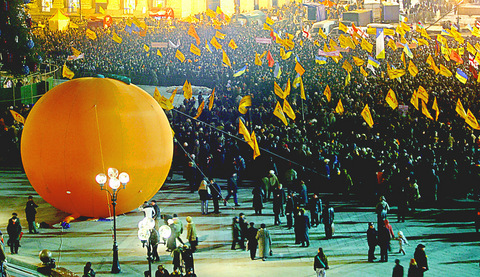On a crooked lane in the Crimean capital the afternoon prayer in the Kebir mosque has just let out and a group of believers gathers beneath its lone minaret to say their presidential vote in Ukraine's weekend ballot will be a vote against Russia.
It is a heartfelt sentiment among Crimea's quarter of a million Tartars who make up 12 percent of the peninsula's population.

PHOTO: AP
More than 60 years have passed since the Soviet Red Army drove the entire Tartar population from Crimea at gunpoint on suspicion of collaborating with the Nazis during World War II and it has been more than a decade since Ukraine parted ways with Russia.
But the Tartars still regard Moscow's policies with deep distrust.
"Better dirty American democracy than Russian totalitarianism," said Muhamad Vilor Osmanov, a Tatar student in a local university who like many of his kin opposes the Russian-speaking, Moscow-backed presidential candidate Viktor Yanukovich.
Yanukovich, who has pledged closer ties to Russia and official status for the Russian language in Ukraine if he is elected, had Russian President Vladimir Putin's backing from the beginning of the campaign.
He has proved massively popular with the Russian-speaking populations elsewhere in eastern and southern Ukraine, but Crimea's Islamic residents do not share that enthusiasm for Moscow's man.
"If Yanukovich comes to power he will emulate Putin's regime. Look at the mess he made in Chechnya," Osmanov said of the Russian president.
The Tartars' relationship with the much larger Russian population of the Crimean peninsula has never been easy.
In 1944, more than 200,000 Crimean Tartars, descendants of the Mongol Golden Horde, were deported to Siberia and Central Asia.
And for centuries the Russian Empire fought bloody wars with the Tartars' ethnic cousins from Ottoman Turkey to retain control of this strategic Black Sea territory, which was only signed over to Ukraine in 1956 by the late Soviet leader Nikita Khrushchev.
But the elections have pitted the two communities against each other anew ahead of a rerun presidential vote scheduled for Sunday.
The Tartars' modest tent camp in support of the Western-leaning Viktor Yushchenko -- modeled on the massive opposition tent city which sprang up in Kiev after a contested November ballot -- is overshadowed by masses of Yanukovich supporters who wave Russian flags and brandish banners reading "Forever with Russia."
Data from the last vote, which was declared invalid by Ukraine's top court due to massive fraud and ballot-rigging, point to a vote along ethnic lines with some 16 percent of the population voting for Yushchenko and 82 percent for Yanukovich.

A fire caused by a burst gas pipe yesterday spread to several homes and sent a fireball soaring into the sky outside Malaysia’s largest city, injuring more than 100 people. The towering inferno near a gas station in Putra Heights outside Kuala Lumpur was visible for kilometers and lasted for several hours. It happened during a public holiday as Muslims, who are the majority in Malaysia, celebrate the second day of Eid al-Fitr. National oil company Petronas said the fire started at one of its gas pipelines at 8:10am and the affected pipeline was later isolated. Disaster management officials said shutting the

US Vice President J.D. Vance on Friday accused Denmark of not having done enough to protect Greenland, when he visited the strategically placed and resource-rich Danish territory coveted by US President Donald Trump. Vance made his comment during a trip to the Pituffik Space Base in northwestern Greenland, a visit viewed by Copenhagen and Nuuk as a provocation. “Our message to Denmark is very simple: You have not done a good job by the people of Greenland,” Vance told a news conference. “You have under-invested in the people of Greenland, and you have under-invested in the security architecture of this

Japan unveiled a plan on Thursday to evacuate around 120,000 residents and tourists from its southern islets near Taiwan within six days in the event of an “emergency”. The plan was put together as “the security situation surrounding our nation grows severe” and with an “emergency” in mind, the government’s crisis management office said. Exactly what that emergency might be was left unspecified in the plan but it envisages the evacuation of around 120,000 people in five Japanese islets close to Taiwan. China claims Taiwan as part of its territory and has stepped up military pressure in recent years, including

UNREST: The authorities in Turkey arrested 13 Turkish journalists in five days, deported a BBC correspondent and on Thursday arrested a reporter from Sweden Waving flags and chanting slogans, many hundreds of thousands of anti-government demonstrators on Saturday rallied in Istanbul, Turkey, in defence of democracy after the arrest of Istanbul Mayor Ekrem Imamoglu which sparked Turkey’s worst street unrest in more than a decade. Under a cloudless blue sky, vast crowds gathered in Maltepe on the Asian side of Turkey’s biggest city on the eve of the Eid al-Fitr celebration which started yesterday, marking the end of Ramadan. Ozgur Ozel, chairman of the main opposition Republican People’s Party (CHP), which organized the rally, said there were 2.2 million people in the crowd, but